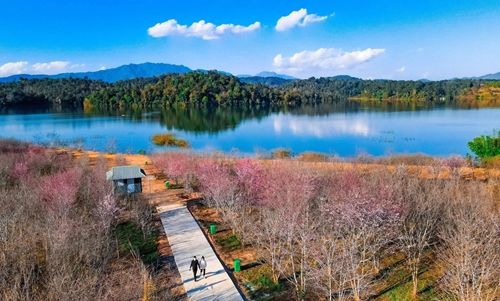According to experts, Thailand – traditionally the top destination in Southeast Asia – is currently suffering negative impacts from tensions along its borderline, raising safety concerns among tourists.
Nguyen Van Tai, CEO of VietSense Travel, said Thailand is both a destination and a source market for Vietnam. With heightened concerns over border tensions, many tourist groups have stopped booking tours, even though the country’s attractions remain open as usual. This situation has also led many businesses to “freeze” plans to exploit the Thai market during the final quarter of the year.
    |
 |
|
Pa Khoang Lake in Dien Bien province |
From another perspective, Tai believes this is an opportunity for Vietnam’s tourism sector, given the country’s favorable geographical location, growing destination brand, continuously improving infrastructure, and increasingly open visa policy. If those advantages are harnessed effectively, Vietnam could fully capture the flow of visitors shifting from other countries in the region.
Sharing this view, Nguyen Tien Dat, Vice President of the Hanoi Tourism Association and Director of AZA Travel, noted that Vietnam is rising in appeal thanks to its beautiful natural landscapes, reasonable travel costs, and attractive experiences. He said easing visa procedures, expanding key markets, and improving visitor experiences will enable the country to make the most of this opportunity.
According to the Vietnam National Authority of Tourism, in July alone, Vietnam welcomed 1.56 million international arrivals, up 6.8% from the same period in 2024. During the first seven months, total international arrivals reached 12.2 million, an annual increase of 22.5%. This demonstrates travelers’ confidence in Vietnam’s stability, a particularly important factor amid the region’s volatile geopolitical landscape.
Turning opportunities into long-term advantages
To turn these advantages into sustainable results, Vietnam’s tourism sector must address existing bottlenecks. Experts point to issues of budget and investment direction from central to local levels, as well as the need for a dedicated mechanism to restore and upgrade tourist sites, rather than diverting revenue from heritage site fees to other purposes. In addition, many travel businesses require support in capital, technology, and management human resources.
In the post-COVID-19 context, most businesses are still striving to recover. Without timely and effective policy support, it will be difficult for them to keep pace with the increasingly fierce competition in the region.
Another key challenge is developing diverse and sustainable tourism products. Nguyen Van Tai noted that Vietnam’s tourism still relies heavily on marine resources and heritage sites, while newer experiential products, local cultural exploration, and green tourism remain limited. In reality, most domestic tour operators are small-scale, with limited capital and a shortage of high-quality personnel. Therefore, he said, a specific support mechanism from the State is needed – from training and communications to financial access – to help travel businesses develop products in line with new trends and meet visitors’ growing expectations.
Nguyen Tien Dat, meanwhile, stressed the importance of focusing on communications and promoting Vietnam’s image as a safe, friendly, and attractive destination.
According to him, the tourism sector must not only capture short-term waves of visitor shifts but also prepare thoroughly in terms of products, services, and human resources to retain tourists and sustain a positive image. Furthermore, improving the tourism environment and resolutely addressing problems such as price gouging are also key factors. Policy measures such as expanding visa exemptions, granting electronic visas, and promoting technology application in visitor flow management should also be implemented harmoniously.
Notably, on August 8, 2025, the Government issued Resolution No. 229/NQ-CP on visa exemptions under the tourism development stimulus program for citizens of 13 European countries: Belgium, Bulgaria, Croatia, the Czech Republic, Hungary, Luxembourg, the Netherlands, Poland, Romania, Slovakia, Slovenia, and Switzerland. Under this policy, citizens of these countries are granted a 45-day visa exemption from the date of entry for the purpose of tourism, regardless of passport type, provided they meet Vietnam’s entry requirements. This policy is expected to strongly boost tourism, helping increase visitors from Europe, a market known for its high spending and diverse travel interests.
Vietnam is well-positioned to attract international travelers seeking safe, stable, and fresh destinations. However, opportunities will only truly turn into competitive advantages if its tourism sector proactively improves product quality, upgrades infrastructure, enhances services, and protects the environment. When that happens, the image of a safe, friendly, and attractive Vietnam will not just be a marketing slogan, but a lived reality that keeps visitors coming back for the long haul.
Source: VNA